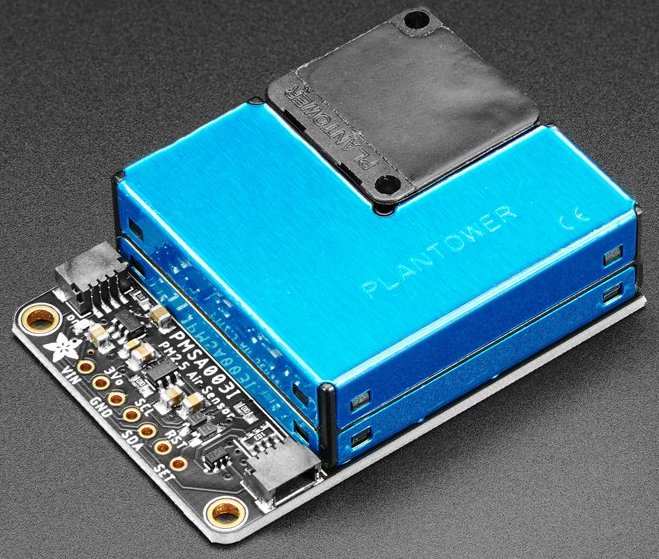PMSA003I Particulate Matter Sensor
The pmsa003i sensor platform allows you to use your Plantower PMSA003I
particulate matter sensor
(datasheet,
Adafruit) with ESPHome.
The I²C Bus is required to be set up in your configuration for this sensor to work.

# Example configuration entry
sensor:
- platform: pmsa003i
pm_1_0:
name: "PM1.0"
pm_2_5:
name: "PM2.5"
pm_10_0:
name: "PM10.0"
pmc_0_3:
name: "PMC >0.3µm"
pmc_0_5:
name: "PMC >0.5µm"
pmc_1_0:
name: "PMC >1µm"
pmc_2_5:
name: "PMC >2.5µm"
pmc_5_0:
name: "PMC >5µm"
pmc_10_0:
name: "PMC >10µm"Configuration variables
pm_1_0 (Optional): Mass of particles with a diameter of 1 micrometres or less (μg/m^3). All options from Sensor.
pm_2_5 (Optional): Mass of particles with a diameter of 2.5 micrometres or less (μg/m^3). All options from Sensor.
pm_10_0 (Optional): Mass of particles with a diameter of 10 micrometres or less (μg/m^3). All options from Sensor.
pmc_0_3 (Optional): Count of particles with diameter > 0.3 um in 0.1 L of air (#/0.1L). All options from Sensor.
pmc_0_5 (Optional): Count of particles with diameter > 0.5 um in 0.1 L of air (#/0.1L). All options from Sensor.
pmc_1_0 (Optional): Count of particles with diameter > 1 um in 0.1 L of air (#/0.1L). All options from Sensor.
pmc_2_5 (Optional): Count of particles with diameter > 2.5 um in 0.1 L of air (#/0.1L). All options from Sensor.
pmc_5_0 (Optional): Count of particles with diameter > 5 um in 0.1 L of air (#/0.1L). All options from Sensor.
pmc_10_0 (Optional): Count of particles with diameter > 10 um in 0.1 L of air (#/0.1L). All options from Sensor.
standard_units (Optional, boolean):
Trueto use standard units orFalseto use environmental units. Defaults toTrue.address (Optional, int): Manually specify the I²C address of the sensor. Defaults to
0x12.update_interval (Optional, Time): The interval to check the sensor. Defaults to
60s.
ℹ️ Note
Standard vs environmental units from https://publiclab.org/questions/samr/04-07-2019/how-to-interpret-pms5003-sensor-values#c23772
“Standard” refers to the concentration “corrected” to the “standard atmosphere” which in the US is DEFINED as “having a temperature of 288.15 K at the sea level 0 km geo-potential height and 1013.25 hPa” details here
On the other hand, the “ambient conditions” are just as the air is “now” (whatever temperature and pressure there is) Now what does that mean …
Air being a gas, it is compressible which means that it changes its volume when the pressure changes so when you report concentrations as mass per volume of air it is relevant at what pressure that volume is calculated. For example, if you have a bunch of particles rising in the air in a bubble (no loss of particles, no addition, they’re just riding a bubble up in the air) then, as they rise, the pressure drops so what was 1cc at the ground it is now 2cc so the concentration is now half without anything actually changing other than the ambient pressure. So, it is common to report concentrations (of anything) as “x mg per standard m3” and because we scientist don’t like to write much (current example excluded) you’ll usually see the “standard” being dropped because it is “implicit”.

